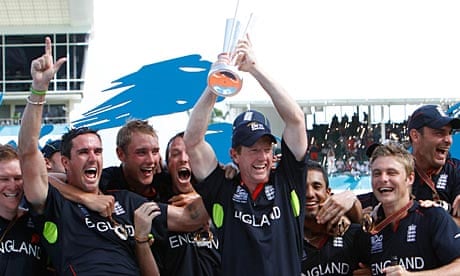For years, with each successive strategy document published, it has been an ECB mission statement that an ICC global event has to be won. Time and again there has been failure. Not now, though. At Kensington Oval, a sea of colour, noise and throbbing music, they overcame Australia to win the World Twenty20.
Australia were not just beaten, they were annihilated, by seven wickets with 18 balls of the match remaining, their muscularity with the bat held at bay by England's all‑round excellence with the ball, and then, when Michael Clarke wanted some incisive bowling from his vaunted pace attack, utterly dominated by the England batting. Only twice, in chasing 148 to win, did England falter. Michael Lumb drilled a catch to mid-on towards the end of the first over of the reply and later Kevin Pietersen and Craig Kieswetter, man of the match, fell within an over of each other to leave two new batsmen together.
By then, though, the damage had been done, for those two – Pietersen, in simply stupendous form and once more looking the genius we believe him to be, and Kieswetter, trusting his eye and instinct – had exposed how uncharacteristically timid the Australian batting had been, and all but sealed the match with an electric second wicket stand of 111 that came at almost 10 an over.
• Paul Collingwood hails England's Twenty20 world beaters
• Vic Marks: England have learnt to make their own luck
• On the blog: Andy Bull on KP's crucial contribution
• In pictures: the best images of England's triumph in Barbados
• Rob Smyth's OBO: 'Fantastic scenes of pure, childlike joy'
Pietersen was eventually caught at long‑off for 47 from 31 balls and Kieswetter, bowled by Mitchell Johnson as he backed away and bothered not to play a shot, a nerveless swashbuckling 63 from 49 balls, the first half century by either England opener in the tournament. Did Australia sense a slender chance to come back yet again from the dead? Paul Collingwood and Eoin Morgan, attacking the feeble and vulnerable fifth bowler Shane Watson made sure it was not, Collingwood, fittingly (for he has been an excellent leader) hitting successively 6,4,4 to finish things before running into the ecstatic arms of his colleagues.
In three overs between 11 and 13, one each from Watson, Shaun Tait and Dirk Nannes, Pietersen and Kieswetter made sure there were to be no hiccups. It was calculated assault and battery. Watson was swung over square leg for six and 16 eventuated from the over. Tait was murdered over long-on and long-off by Pietersen, and finally Nannes was pulverised for 14. Forty five from 3 overs. With his main strike bowlers all but bowled out, Clarke had nowhere to go. The lack of balance in the Australian attack had been exposed.
There were jitters on both sides at the start, tangible in some of England's hard-handed fielding. But Australia's hare-brained running between the wickets too was evidence of more than simple urgency, and ought to have cost them more than it did. Evidenced too in the manner in which Kieswetter parried the edge offered by Shane Watson to the third ball of the match, the rebound fortunately going within reach of Graeme Swann at slip to give England and Ryan Sidebottom a perfect start. By the time the second over was done, the other muscular opener David Warner had been spectacularly run out from extra cover as Michael Lumb swooped in on the shortest of singles and, diving, threw the stumps down. When, two balls later, Brad Haddin was given out caught down the legside off Sidebottom once again, Australia were eight for three and in need of a rebuilding programme. That the ball had hit Haddins hip and not bat was an error by the umpire Billy Doctrove, and Haddins obvious displeasure is sure to cost him.
Now followed some consolidation from Michael Clarke, who had promoted himself to three despite a poor tournament, and David Hussey, as England, bowling beautifully, kept control. By the time the six over power-play was out, Australia had hit a single boundary in making 24 for three, and were to add only one further by the end of the twelfth over, Clarke, in the interim having been deceived in the air by Swann, chipping a catch to midwicket which Collingwood took gymnastically away to his left.
If boundaries had been the hens teeth of the innings so far, that changed in Michael Yardy's third over as Hussey and Cameron White decided the emperor's clothes were off and climbed in, taking 21 from the over with a brace each of fours and sixes downwind to the legside. It was to be Yardy's final over.
Instead, while Swann continued to bowl superbly, Collingwood turned first to Bresnan, who saw Stuart Broad circle under and fail to lay a finger on a skyer from Hussey and then, for the first and only time in the tournament, Luke Wright, whose fourth delivery induced another skewed outside edge from White, with Broad making amends. But the fifth-wicket stand had produced 50 from 37 balls, and given a chance for a final assault. Fifty runs came from the final four overs with David Hussey reaching 59 from 54 balls before he was run out in the final over.
